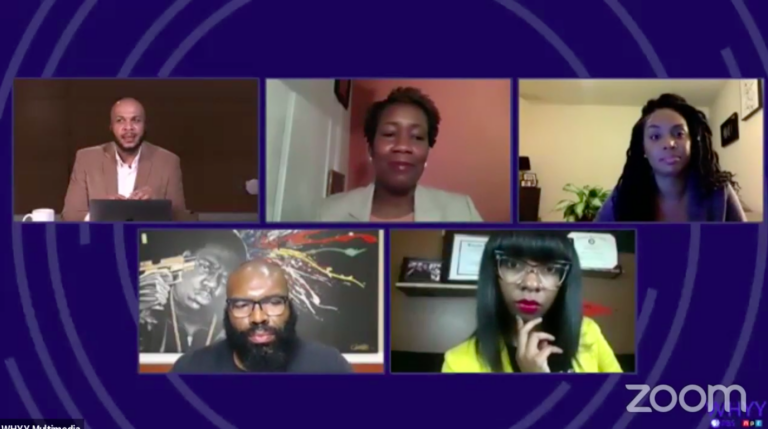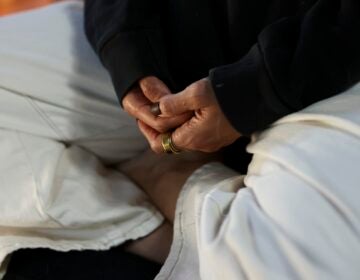‘Living in this world is difficult’: Regional experts on stress and prioritizing mental health in the midst of a double pandemic
Stressors, stigma and self-care were the focus of a virtual community conversation sponsored Wednesday night by WHYY.

Screen shot from WHYY's virtual Community Conversation, 'Preserving Your Mental Health in a Double Pandemic.' (WHYY)
Contemplating the sheer effort of maintaining one’s existence in 2020 can be overwhelming, stressful and anxiety-inducing.
Half of Philadelphia residents report that they or someone in their household has been seriously depressed or anxious since March 1, around the beginning of the COVID-19 pandemic in this country. Nationwide, more than 1 in 3 American adults reported symptoms of anxiety in a survey conducted by the Census Bureau and the Centers for Disease Control and Prevention; that’s in comparison to 1 in 12 at the same time last year.
“I think you would have to be not human to not be anxious [right now],” psychologist Monica Campbell said. “With some of the things that have happened in this country — between the political climate, to seeing Black people murdered in the streets over and over and over again — I think it is completely normal and natural to be anxious during this time. But I would also challenge people to do things to manage that anxiety.”
Philip Roundtree, a mental health advocate who works primarily with Black men and boys, said acknowledging both those feelings and the need to address them is critical. “Living in this world is difficult, we just make it look easy,” Roundtree said. “We’re up against so much adversity on a day-in and day-out basis … we’re here to debunk the myths related to mental health.”
Campbell and Roundtree spoke Wednesday night at a virtual community conversation about stressors, stigma and self-care sponsored by WHYY and hosted by Community Contributors and Engagement Editor Christopher “Flood the Drummer” Norris. Campbell was one voice among a group of regional experts who agreed this “double pandemic” has hit people hard … and suggested tools on how to manage it.
The panel opened with a special presentation by Richard Taylor, a Chicago-born, Seattle-based mental health advocate and author who hosts the podcast “Between the Dream.” He talked about the importance of “getting over the hump” and highlighted three key steps: recognizing the importance of mental health, looking for hope, and embracing power in community.
“You are not losing in life, you are simply between the dream … when you embrace your process, you embrace your progress,” he told listeners.
It’s natural to feel anxious, given current events and the global pandemic. But mental health struggles don’t always manifest in feelings of trepidation or panic, said Sarah-Ashley Andrews, founder of mental health organization Dare 2 Hope and co-host of the podcast “Black in Therapy.”
“There are a number of ways people can express fear and anxiety; people always think it has to be a full-fledged panic attack, and that is not the case,” Andrews said. “Sometimes it’s agitation, sometimes it’s [lack of] focus, sometimes it’s thoughts wandering all over the place … sometimes it’s, I’m just withdrawn.”
Though anxiety and depression are separate struggles, they often go hand in hand. Experts on the panel suggested meditation, breathing exercises, and physical activity outdoors as ways to moderate both. Exercise releases endorphins in your brain, Roundtree explained; those chemicals help improve your mood.
Philadelphia-based mental health advocate and writer Felicia Roche said she runs, does yoga, and meditates as a way to stay on track mentally and emotionally. “That’s a part of what I call my medicine … it does take practice, and it takes time, but I think the idea is connecting and being grounded.”
And all the panel members recommended therapy and medication as useful tools to maintain function in the middle of a pandemic.
“So many times, we think, ‘Oh, I can’t take medication, that means you know I’m really crazy, I don’t want to go that route, I don’t believe in putting stuff in my body,’ OK,” Campbell said. “But if we’re getting to the point where anxiety or depression makes it really difficult to function, or if we’re thinking about hurting ourselves, killing ourselves, we just can’t seem to do the things that we need to do — therapy and medication really are our best tools.”
“Therapy is dope,” Andrews added.
Therapy and self-care
For those brand new to the world of therapy, the terminology may be confusing. Psychologists are trained at the doctor level, and are trained to offer therapy; psychiatrists are medical doctors, physicians, and tend to prescribe medication. But there are also a host of other qualified people who do therapy, including licensed professional counselors, licensed social workers, marriage and family therapists, and others. “I think it’s really deciding what you’re looking for,” said Campbell, who is a licensed psychologist.
What about those who would rather seek help from spiritual leaders?
“That’s a great question,” said Roche, who does mental health advocacy work in the church. “I definitely feel strongly that spirituality plays a major part in what we could consider healing — not therapy, but healing — and so if someone is spiritual, if someone has their practices, I would never say don’t lean on that.”
What she would recommend is adding to it with a psychologist or psychiatrist, to attend to both spiritual and mental health. “In the same way, if you had a physical ailment, you would go to your pastor or your spiritual leader and ask them to pray for you, I would hope that that wouldn’t negate going to a doctor as well,” Roche said.
At the end of the day, Campbell said, “Therapy is a way to cope with problems. People cope with problems in all different kinds of ways: Some people drink, some people use drugs, some people overeat, some people spend a lot of money. So if we really frame therapy as, ‘This is just another way, this is a healthy way that you’re choosing to cope with a problem,’ I think it’s helpful.”
In the middle of a pandemic, tense national politics and tragedies both local and national, the media themselves can become a trigger point for mental health, said Norris — who self-identifies as a “news junkie.”
What can people do to balance their media diet so that they’re informed, but not triggered?
“Boundaries,” Andrews responded almost instantly. “Boundaries and limits. Watch the news, be informed, but know that you need to take a break from it … it’s always good to be informed, but I don’t think that we have to have our notifications on our phones all the time, breaking news, things like that.”
Roundtree seconded the notification recommendation, adding that limited phone use can be useful. Campbell said she often recommends that her clients limit themselves to an hour or so: “You watch a half-hour of the local news, a half-hour of the national news, and by that point they’re just repeating themselves.”
The experts also fielded a range of other questions:
How to stay purposeful in a pandemic? Be creative, explore new projects or passions; practice affirmations, if that works for you (Andrews has a book of “Monday motivation”). Check in with yourself and your own boundaries, learn to state what you want and need (Roche calls this “the value in being kind to yourself”).
How to manage isolation vs. solitude? Know that solitude can often be restful. Engage with nature and lean into activity. Recognize when isolation becomes unhealthy or lonely. Check in on your own feelings.
How to get better sleep? Turn off electronics like television, laptops and phones. Build routines and try to regulate your eating and sleep schedule if possible. Don’t make a habit of doing tasks while still in bed. (“You want the bed associated with sleep and sex.” said Campbell, “that’s it”.)
How to maintain mental health as a parent, while helping kids manage their own? Check in and “be open to talking, even when they are not” as consistently as possible, Roche said.
Tips for elders and those living alone? Write letters; teach older folks how to use video chat or text. When possible, pets and plants can help to simply fill a space with living things, Campbell said.
Most of all, prioritize self-care and “be unapologetic about it,” Andrews said. “Communicating that in a way that people understand, not over-explaining yourself … but being unapologetic about our boundaries, because we owe it to ourselves.”
“I think we as Black people, we get a lot of messages about what we’re supposed to do for other people, how we’re supposed to be involved and engaged, and a number of different things,” said Campbell. One thing that can help, she said, is creating self-care goals: making a certain amount of time for walking, meditation, etc., that automatically creates boundaries around the time you’ve carved out for essential self-care.
The habits of centering others can be difficult to unlearn, Roundtree said. But so can a lot of things associated with mental health, Roche added: “We’re unlearning so many things that we’ve been conditioned to do. I’m so happy for these types of discussions, because we do have to get to a point where we’re normalizing taking care of ourselves first.”
Since Roche began caring for herself — focusing on her health, becoming unapologetic about her boundaries and practices, she said — “I’m able to do so much more for everyone else, because everything that I’m giving is overflow. My cup is filled, so that overflow is what everyone else gets, instead of my trying to pour out from an empty cup.”
That’s the importance of prioritizing your mental health in the midst of a pandemic.

Get daily updates from WHYY News!
WHYY is your source for fact-based, in-depth journalism and information. As a nonprofit organization, we rely on financial support from readers like you. Please give today.



![CoronavirusPandemic_1024x512[1]](https://whyy.org/wp-content/uploads/2020/03/CoronavirusPandemic_1024x5121-300x150.jpg)



